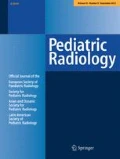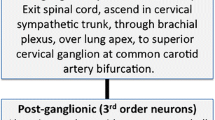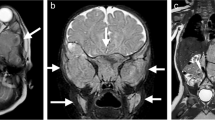Abstract
Neuroblastoma is the most common neoplasm associated with pediatric Horner syndrome. The laboratory and imaging evaluation of isolated pediatric Horner syndrome is controversial. We review the literature published in the last several decades and present the rationale for the imaging work-up in this patient cohort.






Similar content being viewed by others
References
Karemaker JM (2017) An introduction into autonomic nervous function. Physiol Meas 38:R89–R118
Lykstad J, Reddy V, Hanna A (2020) Neuroanatomy, pupillary dilation pathway. In: StatPearls. StatPearls Publishing, Treasure Island, FL. https://www.ncbi.nlm.nih.gov/books/NBK535421/
Gross JR, McClelland CM, Lee MS (2016) An approach to anisocoria. Curr Opin Ophthalmol 27:486–492
Martin TJ (2018) Horner syndrome: a clinical review. ACS Chem Neurosci 9:177–186
Smith SJ, Diehl N, Leavitt JA, Mohney BG (2010) Incidence of pediatric Horner syndrome and the risk of neuroblastoma: a population-based study. Arch Ophthalmol 128:324–329
Abbas A, Manjila S, Singh M et al (2015) Johann Friedrich Horner and the repeated discovery of oculosympathoparesis: whose syndrome is it? Neurosurgery 77:486–491
Wilhelm H (2011) Disorders of the pupil. Handb Clin Neurol 102:427–466
Cohen LM, Elliott A, Freitag SK (2018) Acquired intermittent pediatric Horner syndrome due to neuroblastoma. Ophthalmic Plast Reconstr Surg 34:e38–e41
Albert DM, Rubenstein RA, Scheie HG (1967) Tumor metastasis to the eye. II. Clinical study in infants and children. Am J Ophthalmol 63:727–732
Jaffe N, Cassady R, Petersen R, Traggis D (1975) Heterochromia and Horner syndrome associated with cervical and mediastinal neuroblastoma. J Pediatr 87:75–77
McRae D Jr, Shaw A (1979) Ganglioneuroma, heterochromia iridis, and Horner’s syndrome. J Pediatr Surg 14:612–614
Sayed AK, Miller BA, Lack EE et al (1983) Heterochromia iridis and Horner's syndrome due to paravertebral neurilemmoma. J Surg Oncol 22:15–16
O’Glasser AY, Milas KM (2016) Horner’s, heterochromia, and harlequins. J Gen Intern Med 31:137
Morrison DA, Bibby K, Woodruff G (1997) The “harlequin” sign and congenital Horner’s syndrome. J Neurol Neurosurg Psychiatry 62:626–628
Bremner F (2019) Apraclonidine is better than cocaine for detection of Horner syndrome. Front Neurol 10:55
Braungart S, Craigie RJ, Farrelly P, Losty PD (2019) Paediatric Horner’s syndrome: is investigation for underlying malignancy always required? Arch Dis Child 104:984–987
Loewenfeld IE (1977) “Simple central” anisocoria: a common condition, seldom recognized. Trans Sect Ophthalmol Am Acad Ophthalmol Otolaryngol 83:832–839
Lam BL, Thompson HS, Corbett JJ (1987) The prevalence of simple anisocoria. Am J Ophthalmol 104:69–73
Reede DL, Garcon E, Smoker WRK, Kardon R (2008) Horner’s syndrome: clinical and radiographic evaluation. Neuroimaging Clin N Am 18:369–385, xi
Barrea C, Vigouroux T, Karam J et al (2016) Horner syndrome in children: a clinical condition with serious underlying disease. Neuropediatrics 47:268–272
Nagy AN, Hayman LA, Diaz-Marchan PJ, Lee AG (1997) Horner’s syndrome due to first-order neuron lesions of the oculosympathetic pathway. AJR Am J Roentgenol 169:581–584
George A, Haydar AA, Adams WM (2008) Imaging of Horner’s syndrome. Clin Radiol 63:499–505
Giles CL, Henderson JW (1958) Horner’s syndrome: an analysis of 216 cases. Am J Ophthalmol 46:289–296
George ND, Gonzalez G, Hoyt CS (1998) Does Horner’s syndrome in infancy require investigation? Br J Ophthalmol 82:51–54
Ben Shabat A, Ash S, Luckman J et al (2019) Likelihood of diagnosing neuroblastoma in isolated Horner syndrome. J Neuroophthalmol 39:308–312
Robertson WC, Pettigrew LC (2003) “Congenital” Horner’s syndrome and carotid dissection. J Neuroimaging 13:367–370
Gupta M, Dinakaran S, Chan TK (2005) Congenital Horner syndrome and hemiplegia secondary to carotid dissection. J Pediatr Ophthalmol Strabismus 42:122–124
Beckerman BL, Seaver R (1978) Congenital Horner’s syndrome and thoracic neuroblastoma. J Pediatr Ophthalmol Strabismus 15:24–25
Musarella MA, Chan HS, DeBoer G, Gallie BL (1984) Ocular involvement in neuroblastoma: prognostic implications. Ophthalmology 91:936–940
Jeffery AR, Ellis FJ, Repka MX, Buncic JR (1998) Pediatric Horner syndrome. J AAPOS 2:159–167
Zafeiriou DI, Economou M, Koliouskas D et al (2006) Congenital Horner’s syndrome associated with cervical neuroblastoma. Eur J Paediatr Neurol 10:90–92
Kadom N, Rosman NP, Jubouri S et al (2015) Neuroimaging experience in pediatric Horner syndrome. Pediatr Radiol 45:1535–1543
Martin GC, Aymard P-A, Denier C et al (2017) Usefulness of cocaine drops in investigating infant anisocoria. Eur J Paediatr Neurol 21:852–857
Ott C, Bobylev A, Holland-Cunz SG, Mayr J (2018) Unilateral straight hair-a symptom of acquired Horner’s syndrome in a neonate. European J Pediatr Surg Rep 6:e32–e36
Berroth ML, Morozova LV, Pollock JM (2020) Ectopic thymus as a cause of Horner’s syndrome. Radiol Case Rep 15:23–25
Akkary S (1964) Malignant carotid body tumour in the neck of a newborn infant. Arch Dis Child 39:194–196
Deprez FC, Coulier J, Rommel D, Boschi A (2015) Congenital Horner syndrome with heterochromia iridis associated with ipsilateral internal carotid artery hypoplasia. J Clin Neurol 11:192–196
Ryan F-H, Kline LB, Gomez C (2000) Congenital Horner’s syndrome resulting from agenesis of the internal carotid artery. Ophthalmology 107:185–188
Dinc H, Alioglu Z, Erdol H, Ahmetoglu A (2002) Agenesis of the internal carotid artery associated with aortic arch anomaly in a patient with congenital Horner’s syndrome. AJNR Am J Neuroradiol 23:929–931
Fons C, Vasconcelos M, Vidal M et al (2009) Agenesis of internal carotid artery in a child with ipsilateral Horner’s syndrome. J Child Neurol 24:101–104
Cagan E, Sayin R, Dogan M et al (2010) Bilateral brachial plexus palsy and right Horner syndrome due to congenital cervicothoracal syringomyelia. Brain Dev 32:595–597
Jurca MC, Kozma K, Petchesi CD et al (2017) Anatomic variants in Dandy-Walker complex. Romanian J Morphol Embryol 58:1051–1055
Lee N, Nam S-O, Kim YM, Lee Y-J (2016) A neonate with Joubert syndrome presenting with symptoms of Horner syndrome. Korean J Pediatr 59:S32–S36
Puvanachandra N, Heran MK, Lyons CJ (2008) Morning glory disk anomaly with ipsilateral capillary hemangioma, agenesis of the internal carotid artery, and Horner syndrome: a variant of PHACES syndrome? J AAPOS 12:528–530
Sankaran A, Bhardwaj P, Venkatramani H, Sabapathy SR (2018) Birth palsy in congenital varicella syndrome: a lesson in anatomy. Indian J Plast Surg 51:238–242
Naimer SA, Weinstein O, Rosenthal G (2000) Congenital Horner syndrome: a rare though significant complication of subclavian flap aortoplasty. J Thorac Cardiovasc Surg 120:419–421
Woodruff G, Buncic JR, Morin JD (1988) Horner’s syndrome in children. J Pediatr Ophthalmol Strabismus 25:40–44
Massimi L, Pepa Della GM, Tamburrini G, Di Rocco C (2011) Sudden onset of Chiari malformation type I in previously asymptomatic patients. J Neurosurg Pediatr 8:438–442
Shewmon DA (1983) Unilateral straight hair in congenital Horner syndrome due to stellate ganglion tumor. Ann Neurol 13:345–346
Gibbs J, Appleton RE, Martin J, Findlay G (1992) Congenital Horner syndrome associated with non-cervical neuroblastoma. Dev Med Child Neurol 34:642–644
Moukheiber AK, Nicollas R, Roman S et al (2001) Primary pediatric neuroblastic tumors of the neck. Int J Pediatr Otorhinolaryngol 60:155–161
Mahoney NR, Liu GT, Menacker SJ et al (2006) Pediatric horner syndrome: etiologies and roles of imaging and urine studies to detect neuroblastoma and other responsible mass lesions. Am J Ophthalmol 142:651–659
Pollard ZF, Greenberg MF, Bordenca M, Lange J (2010) Atypical acquired pediatric Horner syndrome. Arch Ophthalmol 128:937–940
Alvi S, Karadaghy O, Manalang M, Weatherly R (2017) Clinical manifestations of neuroblastoma with head and neck involvement in children. Int J Pediatr Otorhinolaryngol 97:157–162
Sauer C, Levingohn MW (1976) Horner’s syndrome in childhood. Neurology 26:216–220
Shikatani Y, Okazaki M, Sakao N et al (2015) A case of mediastinal granular cell tumor with Horner’s syndrome. Ann Thorac Cardiovasc Surg 21:567–569
Reid G, Purcell B, McNally O (2017) Metastatic testicular cancer, a Horner’s syndrome and brachial plexopathy. QJM 110:585–586
Spors B, Seemann J, Homer N, Fay A (2017) Lymphatic malformation with acquired Horner syndrome in an infant. BMJ Case Rep 2017:bcr2017013315
Watura K, Williams M, Bradley M (2015) Osteochondroma of the clavicle causing Horner’s syndrome. BMJ Case Rep 2015:bcr2015211705
Spector RH (2008) Postganglionic horner syndrome in three patients with coincident middle ear infection. J Neuroophthalmol 28:182–185
Safran MJ, Greenwald MJ, Rice HC, Polin KS (1990) Cervical spine dislocation presenting as an isolated Horner’s syndrome. Arch Ophthalmol 108:327–328
Sohal APS, Dasarathi M, Gholkar A, McFarland R (2010) Unilateral Horner’s syndrome: an unusual childhood presentation. J Paediatr Child Health 46:695–701
Pirouzian A, Holz HA, Ip KC, Sudesh R (2010) Acquired infantile Horner syndrome and spontaneous internal carotid artery dissection: a case report and review of literature. J AAPOS 14:172–174
Bayhan GI, Karaca M, Yazici U, Tanir G (2010) A case of Horner’s syndrome after the surgical treatment of pulmonary hydatid cyst. Turkiye Parazitol Derg 34:196–199
Kumar KP, Alam MS (2018) “Collateral damage:” Horner’s syndrome following excision of a cervical vagal schwannoma. Int J Appl Basic Med Res 8:190–192
van Santen HM, Aronson DC, Vulsma T et al (2004) Frequent adverse events after treatment for childhood-onset differentiated thyroid carcinoma: a single institute experience. Eur J Cancer 40:1743–1751
Demiral M, Binay C, Simsek E, Ilhan H (2017) Horner syndrome secondary to thyroid surgery. Case Rep Endocrinol 2017:1689039
Giannikas C, Pomeranz HD, Smith LP, Fefer Z (2014) Horner syndrome after tonsillectomy: an anatomic perspective. Pediatr Neurol 51:417–420
Urfalioglu S, Acipayam C, Guler M et al (2020) A rare catheter complication in a patient with neuroblastoma: Horner’s syndrome. Ophthalmic Plast Reconstr Surg 36:e43–e44
Ghosh PS, Indulkar S (2012) Horner’s syndrome as complication of extracorporeal membrane oxygenation in a neonate. J Pediatr 160:349–349.e1
Mutalib M, Vandervelde C, Varghese A et al (2007) Horner’s syndrome secondary to asymptomatic pneumothorax in an adolescent. Eur J Pediatr 166:507–508
Folkert KN, de Beaufort H, Bauman NM (2020) Horner syndrome from a pediatric otolaryngology perspective. Ann Otol Rhinol Laryngol 129:191–194
Cebeci D, Arhan E, Demir E et al (2018) Internal carotid artery dissection without intracranial infarct following a minor shoulder trauma: the second pediatric case and review of the literature. J Clin Neurosci 56:172–175
Kanagalingam S, Miller NR (2015) Horner syndrome: clinical perspectives. Eye Brain 7:35–46
Weetman RM, Rider PS, Oei TO et al (1976) Effect of diet on urinary excretion of VMA, HVA, metanephrine, and total free catecholamine in normal preschool children. J Pediatr 88:46–50
Sundell IB, Hallmans G, Nilsson TK, Nygren C (1989) Plasma glucose and insulin, urinary catecholamine and cortisol responses to test breakfasts with high or low fibre content: the importance of the previous diet. Ann Nutr Metab 33:333–340
Tormo C, Lumbreras B, Santos A et al (2009) Strategies for improving the collection of 24-hour urine for analysis in the clinical laboratory: redesigned instructions, opinion surveys, and application of reference change value to micturition. Arch Pathol Lab Med 133:1954–1960
Smith SJ, Diehl NN, Smith BD, Mohney BG (2010) Urine catecholamine levels as diagnostic markers for neuroblastoma in a defined population: implications for ophthalmic practice. Eye (Lond) 24:1792–1796
Park JR, Eggert A, Caron H (2010) Neuroblastoma: biology, prognosis, and treatment. Hematol Oncol Clin North Am 24:65–86
Laug WE, Siegel SE, Shaw KN et al (1978) Initial urinary catecholamine metabolite concentrations and prognosis in neuroblastoma. Pediatrics 62:77–83
LaBrosse EH, Com-Nougue C, Zucker JM et al (1980) Urinary excretion of 3-methoxy-4-hydroxymandelic acid and 3-methoxy-4-hydroxyphenylacetic acid by 288 patients with neuroblastoma and related neural crest tumors. Cancer Res 40:1995–2001
Park JR, Bagatell R, Cohn SL et al (2017) Revisions to the International Neuroblastoma Response Criteria: a consensus statement from the National Cancer Institute clinical trials planning meeting. J Clin Oncol 35:2580–2587
El-Sayed AAF (2014) The prognostic value of concurrent Horner syndrome in extended Erb obstetric brachial plexus palsy. J Child Neurol 29:1356–1359
Yoshida K, Kawabata H (2018) The prognostic value of concurrent Horner syndrome in surgical decision making at 3 months in total-type neonatal brachial plexus palsy. J Hand Surg Eur Vol 43:609–612
Lequin MH, Peeters EAJ, Holscher HC et al (2004) Arterial infarction caused by carotid artery dissection in the neonate. Eur J Paediatr Neurol 8:155–160
Moore SW, Satge D, Sasco AJ et al (2003) The epidemiology of neonatal tumours. Report of an international working group. Pediatr Surg Int 19:509–519
Raciborska A, Bilska K, Weclawek-Tompol J et al (2016) Solid cancers in the premature and the newborn: report of three national referral centers. Pediatr Neonatol 57:295–301
Desandes E, Guissou S, Ducassou S, Lacour B (2016) Neonatal solid tumors: incidence and survival in France. Pediatr Blood Cancer 63:1375–1380
Chandrasekaran A (2018) Neonatal solid tumors. Pediatr Neonatol 59:65–70
Vo KT, Matthay KK, Neuhaus J et al (2014) Clinical, biologic, and prognostic differences on the basis of primary tumor site in neuroblastoma: a report from the international neuroblastoma risk group project. J Clin Oncol 32:3169–3176
Park Y, Lee HJ, Jung YJ et al (2018) Prenatally detected thoracic neuroblastoma. Obstet Gynecol Sci 61:278–281
Jnah AJ, Evans SK, Sewell K, Trembath A (2019) Neuroblastoma in a neonate: a case report. Neonatal Netw 38:341–347
Dresler S, Harvey DG, Levisohn PM (1979) Retroperitoneal neuroblastoma widely metastatic to the central nervous system. Ann Neurol 5:196–198
Lee SY, Chuang JH, Huang CB et al (1998) Congenital bilateral cystic neuroblastoma with liver metastases and massive intracystic haemorrhage. Br J Radiol 71:1205–1207
Sul HJ, Kang DY (2003) Congenital neuroblastoma with multiple metastases: a case report. J Korean Med Sci 18:618–620
Schiavetti A, Foco M, Ingrosso A et al (2009) Congenital stage 1 neuroblastoma evolved into stage 4s. J Pediatr Hematol Oncol 31:59–60
Tajiri T, Souzaki R, Kinoshita Y et al (2010) Concordance for neuroblastoma in monozygotic twins: case report and review of the literature. J Pediatr Surg 45:2312–2316
Wader JV, Kumbhar SS, Shukla DB, Mavi S (2015) Disseminated congenital neuroblastoma — an autopsy case report. J Clin Diagn Res 9:ED03–ED04
Starchenko II, Dyachenko LV, Prylutskyi OK et al (2019) The observation of congenital retroperitoneal large size neuroblastoma. Exp Oncol 41:179–181
Claros P, Bandos R, Gilea I et al (1999) Major congenital anomalies of the internal carotid artery: agenesis, aplasia and hypoplasia. Int J Pediatr Otorhinolaryngol 49:69–76
Farhat W, Ahdab R, Hosseini H (2011) Congenital agenesis of internal carotid artery with ipsilateral Horner presenting as focal neurological symptoms. Vasc Health Risk Manag 7:37–40
Hageman G, Ippel PF, te Nijenhuis FC (1992) Autosomal dominant congenital Horner's syndrome in a Dutch family. J Neurol Neurosurg Psychiatry 55:28–30
Graef S, Irwin MS, Wan MJ (2020) Incidence and prognostic role of the ocular manifestations of neuroblastoma in children. Am J Ophthalmol 213:145–152
Cohen MD, Auringer ST, Grosfeld JL et al (1993) Multifocal primary neuroblastoma. Pediatr Radiol 23:463–466
Williams P, Wegner E, Ziegler DS (2014) Outcomes in multifocal neuroblastoma as part of the neurocristopathy syndrome. Pediatrics 134:e611–e616
Author information
Authors and Affiliations
Corresponding author
Ethics declarations
Conflicts of interest
None
Additional information
Publisher’s note
Springer Nature remains neutral with regard to jurisdictional claims in published maps and institutional affiliations.
Electronic supplementary material
ESM 1
(PDF 30 kb)
Rights and permissions
About this article
Cite this article
Khalatbari, H., Ishak, G.E. Imaging of Horner syndrome in pediatrics: association with neuroblastoma. Pediatr Radiol 51, 205–215 (2021). https://doi.org/10.1007/s00247-020-04796-w
Received:
Revised:
Accepted:
Published:
Issue Date:
DOI: https://doi.org/10.1007/s00247-020-04796-w




